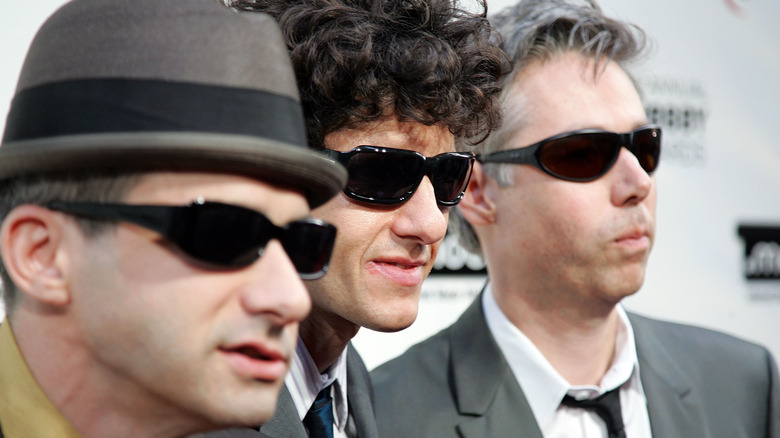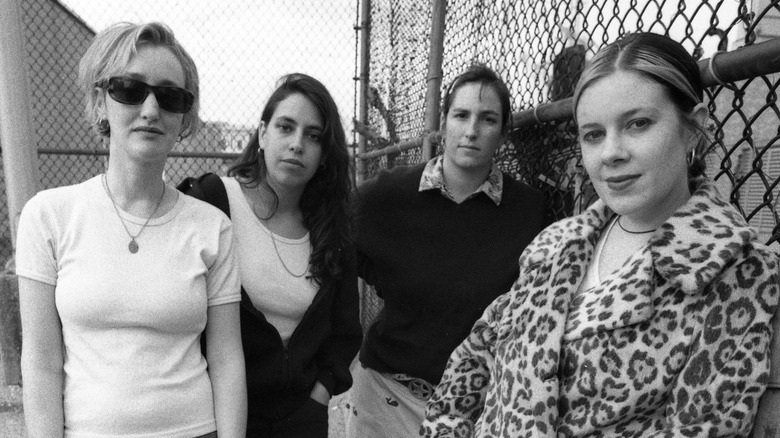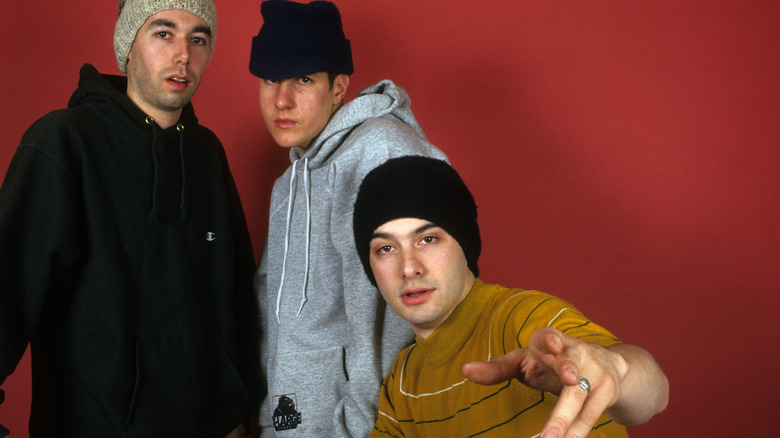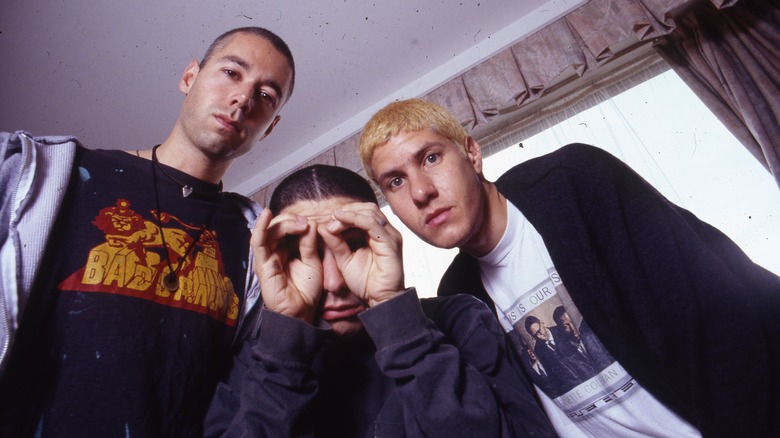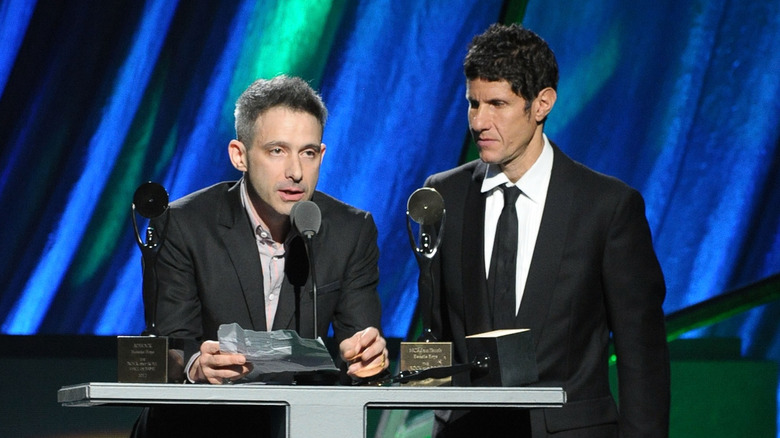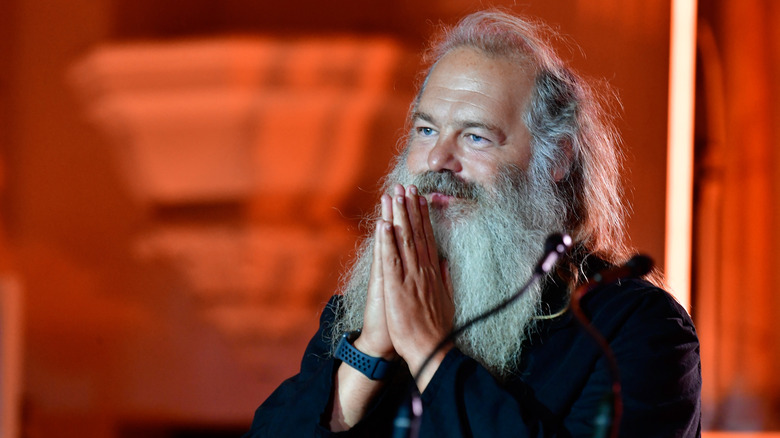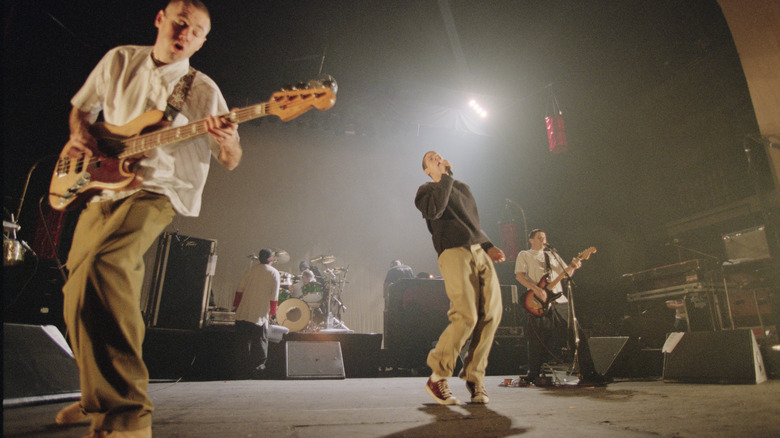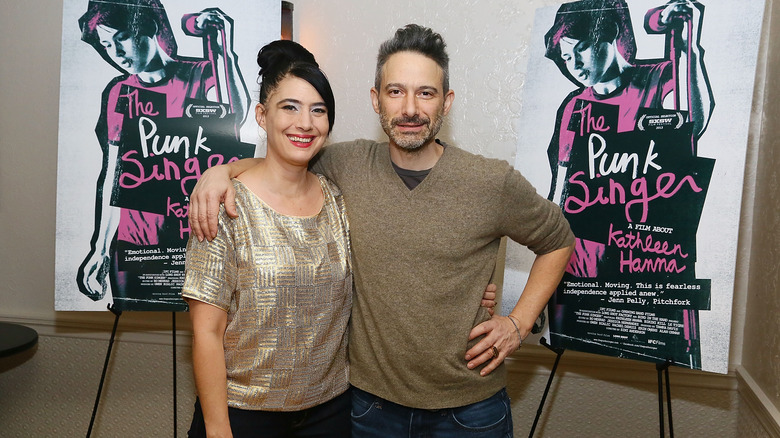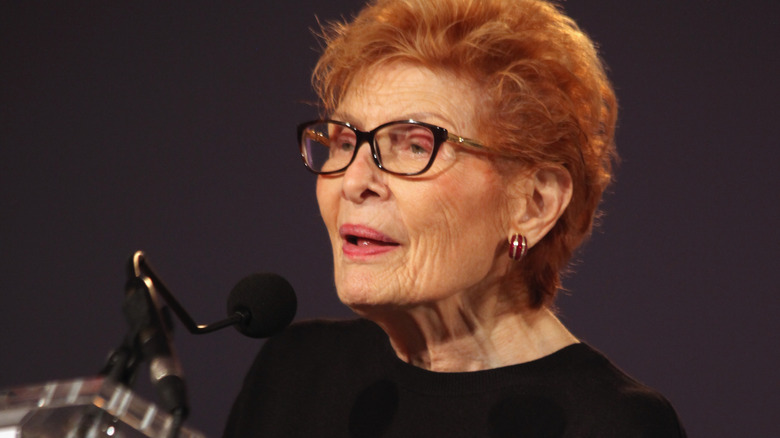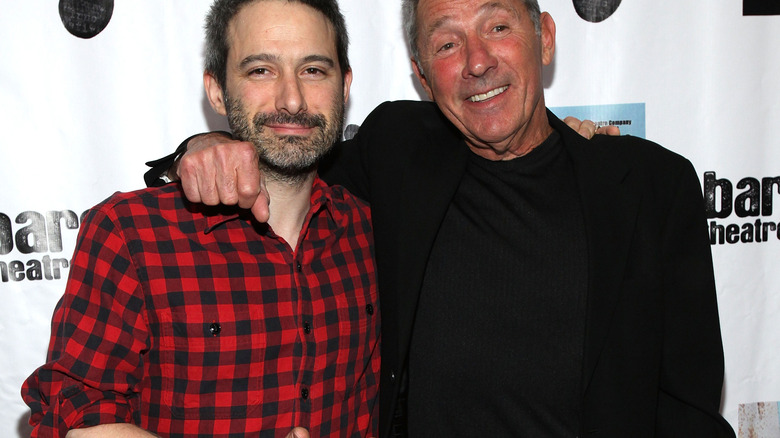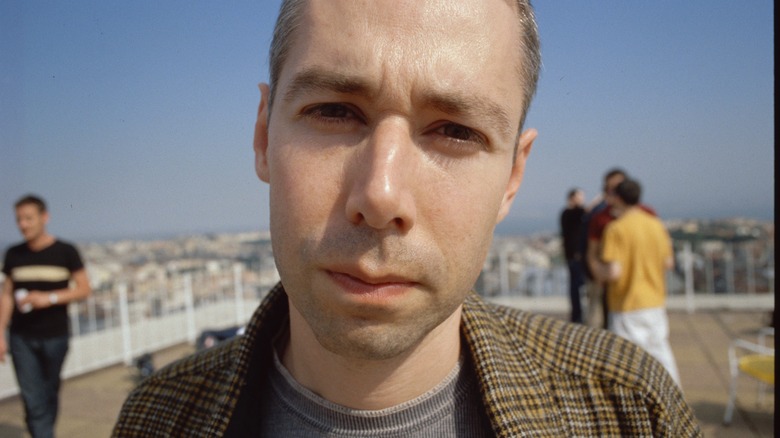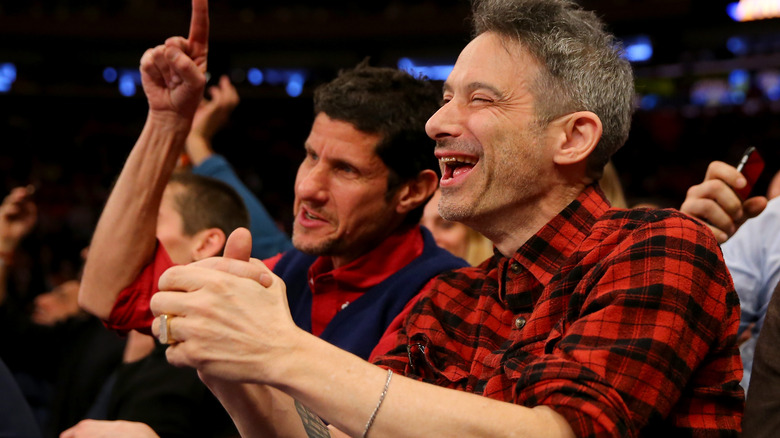Tragic Details About The Beastie Boys
There's really only one of two reactions when a Beastie Boys song comes on the radio: Either people would yes, indeed, like to fight for their right to party thank-you-very-much, or they'll have such a case of the eye rolls they're likely to give themselves a migraine. The latter was the case with most parents who happened to turn on the radio in the late 1980s and early 1990s.
And the kids? They were fighting for their right, and doing it in a very loud way. According to Billboard, "Licensed to Ill" became the first rap album to shoot straight to No. 1 on the Billboard 200 chart. It sat there for an impressive seven weeks, spent 73 weeks on the charts altogether, and sold 10 million copies.
Clearly, what the trio was doing resonated with a lot of people, and it didn't stop there. They'd go on to have more hits and sell millions more records, but as the saying goes — it's lonely at the top. The Beastie Boys weren't just incredibly successful, they were incredibly young — and along the way, they made some major mistakes they came to regret. Tragedy, sadness, family crisis, and saying an early goodbye to one of their own made it clear: Success doesn't guarantee happiness. And it certainly doesn't mean evading life's painful experiences.
No Beastie Girls allowed
In 2019, Slate did a piece on how The Beastie Boys revamped their earlier image and apologized for a lot of the things that had gone on early in their career. The article uses phrases like "toxic misogyny," "noxious and pervasive," and "appallingly sexist," and included in that was the firing of their own female member.
What's that? Don't remember The Beastie Boys having a female drummer? She was around before the group transitioned to their hip-hop sound that made them famous, and according to what Adam Horovitz wrote in the "Beastie Boys Book" (via the New York Post), "We kicked Kate out of the band because she didn't fit into our new tough-rapper-guy identity. Maybe Kate would've eventually quit the band because we were starting to act like a bunch of f*****g creeps, but it was just s****y the way it happened. And I am so sorry about that."
"Kate" is Kate Schellenbach (second from right), the wildly talented drummer who went on to Luscious Jackson. Schellenbach would later tell Tom Tom Mag that once things started getting more into rap and hip-hop and they were doing less of the post-punk music they started in, it wasn't for her anyway. And, while she's admitted "Part of me was jealous of their success," she knew that some of the more questionable, sexist, misogynistic lyrics meant that they had decided to make it very clear there was just no place for a girl in the midst of that.
They've always hated what their biggest song became
There's no denying it: Even people who have no idea what the Beastie Boys have done know (You Gotta) Fight For Your Right (To Party). The Beasties, however, hate it.
Mike Diamond explained to Far Out Magazine that "we might have reinforced certain values of some people in our audience when our own values were actually totally different. There were tons of guys singing along... oblivious to the fact that it was a total goof on them. Irony is often missed."
That irony was hard to see: It was, after all, their first release, and there was little to measure it against aside from the actions of the Beasties themselves. That, in turn, led to the group's public image, which — in all fairness — they leaned into pretty hard.
The song, Diamond has shared, was written in about five minutes and scribbled on napkins at the Palladium. The idea was that they wanted to show that they had, in fact, been working, and it just so happened to fit in with their big plan for making a name for themselves as they toured with Madonna. Diamond told the Independent: "Our big idea was we should be as rude and as awful as possible onstage... We'd be memorable."
So, it's perhaps not surprising that when they released "Fight For Your Right," that the outlet says the audience bought their "Butthead baiting attitude" hook, line, and sinker.
Becoming who they claimed to hate
The surviving Beastie Boys have made it clear that they're sort of backpedaling when it comes to some of their more questionable lyrics. During the "Beastie Boys Story" documentary, Adam Horovitz recited some of the lyrics to "Girls," which includes "Girls, to do the dishes/Girls, to clean up my room/Girls, to do the laundry."
Hilarious? Horovitz didn't think so, at least, not any more. He explained (via Observer) that it "was supposed to be this stupid and ironic joke, but understandably, it wasn't that funny." He continued: "We morphed from making fun of party bros to actually becoming those dudes."
In a career review from The Guardian, they note that it was with the addition of Rick Rubin as DJ and producer that their over-the-top, frat-boy personalities became just as important to their image as their music. Dancers in cages, beer sprayed over crowds, and who could forget the giant, hydraulic, you-know-what?
Mike Diamond, too, has spoken about how they were changed by what had started out as a joke. "At first, it's really funny and totally sarcastic. And then it becomes reality and you become a part of that. It never dawned on us that it would become our job. To be these guys throwing beers over each other night after night..."
Was it the worst? According to them, yes: By the end of 1987, they were no longer really speaking, they were broke, and the schtick was wearing on them.
Founder John Berry died incredibly young
The Beastie Boys trio was originally a 4-piece band that included Mike Diamond, Adam Yauch, drummer Kate Schellenbach and John Berry. Berry, says Rolling Stone, wasn't just credited with giving the group their name, but their earliest shows were played at his Upper West Side apartment. He appeared on their "Polly Wog Stew" EP and left the group not long after. He didn't like the new rules that came with being a serious, album-releasing, concert-playing group, according to the Los Angeles Times.
Still, he was never forgotten — when they were inducted into the Rock and Roll Hall of Fame (pictured), they gave him a shout-out. And when he died in 2016, Diamond issued a statement to Rolling Stone: "John was like my first high school older brother... He showed me what a lack of fear and some reckless abandon could look like. I will forever owe him that debt of punk inspiration."
Berry was just 52 years old at the time of his death, and the official cause was frontal lobe dementia. That, says the Mayo Clinic, is an Alzheimer's-like condition that occurs at a younger age than other forms of dementia, is commonly misdiagnosed, and manifests in extreme personality changes, difficulties with speech and language, and difficulties controlling motor functions. There is no cure.
Def Jam, royalties, and shattered trust
When Rick Rubin (pictured) talked to The Washington Post in 2020, about 30 years had passed since the headline-making split between the Beastie Boys, Def Jam, Rubin, and Def Jam owner Russell Simmons. At the time — 1989 — the Los Angeles Times reported on the situation... what was known about it. On one side were the Beasties, who were claiming that out of the promised $2.5 million, they'd only received $100,000 — so, they bounced to Capitol Records. On the other side, Simmons said that it was the Beasties who had defaulted on their contract by not putting out the album they were supposed to. There were negotiations, accusations of a play for more money, and then — decades later — The Washington Post quoted a pretty shocking stat from the Beastie Boys' book: They claimed that under their Def Jam contract, they would get 10% of the profits, while Rubin and Simmons raked in the other 90%.
Rubin said that he didn't remember it that way at all, but at the same time he couldn't imagine Adam Horovitz just making it up — he acknowledged that just wasn't his thing — he was still pretty mum on the details. Rubin claimed that it was CBS — the owner of Columbia Records, who had an exclusive contract with Def Jam — that cut off all the missing royalties.
Whatever happened, Rubin ended The Washington Post interview with this: "I love Adam. I miss him in my life."
The Beastie Boys' change of heart
Anyone who's familiar with the Beastie Boys knows that they're widely condemned for the homophobic and misogynistic content of their earliest stuff. Slate says that others can learn from their apology and the overhaul of their image, and let's face it: They had a lot to overhaul.
In 1999, Adam Horovitz penned an apology letter (via MTV), and it wasn't just about lyrics or the original name of their "Licensed to Ill" album (which is unprintable). According to interviews and transcripts in the archives of The Village Voice, they were pretty outspoken about their homophobic views.
In 1987, the New Music Exchange outright asked them: "[Do] you hate homosexuals?" Horovitz's knee-jerk reaction was, "I really do... I shouldn't have said that."
Yauch stepped in to try to explain. "We do not need to go into that," he began. "What Adam's talking about — I'll give you this, he definitely hates gay people — but the reason for that is that in this neighborhood, the [people] who hang around here aren't like just gay people — normal gay people — all the sickos... say, 'Hey, kid, I'll give you five bucks if you...'"
Not long after, Yauch went on to reassure reporters that everyone definitely knew they were just kidding but those who interviewed them weren't so sure. Not long after, Horovitz defended Eminem's homophobic lyrics (via NME): "... you got to blame society. You can't take all the blame off him, but you also got to put the blame on a society that, in America at least, raises boys to be sexist, to be homophobic, to be knuckleheads — that's the American way."
Adam Horovitz has cared for his wife through serious medical issues
Adam Horovitz isn't the only musician in the family — he's married to Kathleen Hanna, lead singer of Bikini Kill, punk rock icon, and front-row feminist of the grunge scene. As The New York Times points out, she was the one that first coined "smells like teen spirit." When a documentary on her life came out in 2013, she didn't just talk about her career, she also spoke about her diagnosis of late-stage Lyme disease, and her reliance on her husband.
She describes some grueling struggles, using the NYT interview to thank him for everything from keeping the house clean to changing her IV bags, caring for her during her seizures, and making sure she took each of her 39 daily pills.
In an interview with GQ, Horovitz spoke about his side of the story — including the moment where he filmed a portion of the documentary, featuring a sick and crying Hanna. "She asked me to do a bunch of that stuff," he clarified. "I mean, the whole thing is so surreal."
When asked if he truly believed she would get better and if there were better times ahead, he responded, "I believe there is, yeah. There f****n' better be."
Mike Diamond's mom was swindled out of a ton of money
No one wants to see their parents be taken advantage of, but that's what Mike Diamond and his mother, Hester, went through. According to Hester Diamond's profile on Sotheby's, she and her husband Harold started out as art admirers, and when she got her first job at a New York City antique dealer in the 1950s, there was no looking back. She ultimately became a widely known art collector, and sometimes, not all the attention is good attention.
After her death in 2020, The New York Times interviewed Mike Diamond as he was preparing to sell her collection — which included artwork and sculptures dating back to the 14th century.
One thing that didn't come up in the interview was the time that Hester Diamond was named as one of the victims of art dealer Larry Salander.
Salander, says Reuters, was arrested on charges including grand larceny and fraud, and in 2010, he entered a guilty plea. He had reportedly been targeting collectors, selling art that he didn't actually own, and selling shares in pieces of art multiple times. All said and done, it was estimated that collectors — including Hester Diamond and Robert De Niro — had been taken for more than $100 million. Hester Diamond's portion of that was $6 million: Salander was ordered to pay restitution, and was sentenced to six years in jail.
Adam Horovitz's father was accused of sexual assault
Adam Horovitz's father is Israel Horovitz, an off-Broadway playwright and one of the founders of the Gloucester Stage. In 2017, The New York Times issued a shocking report: Nine women had come forward to accuse him of sexual assault, misconduct, and rape, including Adam Horovitz's high school girlfriend, Jocelyn Meinhardt.
It quickly turned out that the accusations weren't shocking at all — the women had actually come forward before. In 1993, The Boston Phoenix ran a story about 10 women — seven actresses and theater staff members, along with three of the family's nannies — who had accused him of assaults that had happened in the late '80s to early '90s, but the claims were brushed aside. The president of the board of the Gloucester Stage was quoted as saying the women were simply "tightly wound."
Amidst the fresh round of allegations, Adam Horovitz issued his own statement: "I believe the allegations against my father are true, and I stand behind the women that made them."
Variety reported that Israel Horovitz had issued a formal statement as well, saying that he had "a different memory of some of these events. I apologize with all my heart to any woman who has ever felt compromised by my actions." The elder Horovitz died in 2020.
Adam Yauch's death
When The Beastie Boys took the stage in Tennessee on June 12, 2009, they didn't know it was going to be their last performance. But it was, says Rolling Stone: It was also less than three years later that they would be reporting that founding member Adam Yauch had died at the age of 47.
The same year as their final performance, Yauch had been diagnosed with cancer after the discovery of a tumor in his salivary gland.
Less than a month after his death, Rolling Stone talked to Adam Horovitz about the fondest memories they shared, the biggest disagreements, and how they had all handled growing up together — and the changes that went along with it. Yauch had for years not only been open about his own spiritualism and connections with Tibetan Buddhism, but he had also been an outspoken activist in the fight to free Tibet. According to Horovitz — who saw him shortly before his passing — he was comforted by his beliefs.
"I don't believe Adam was afraid," Horovitz said. "Bummed out, yeah. But I can't think when I ever saw him afraid. We got jumped in Brooklyn one time, so we've been afraid in that sense. But, man, he hadn't been afraid in a long time. That gives me peace."
Adam Horovitz has been candid about post-Beastie struggles
After the death of Adam Yauch, the remaining Beastie Boys have been clear: There will be no more Beastie music, and there will definitely be no more live performances. Mike Diamond and Adam Horovitz have presented a united front on that, and they've been candid about their struggles as they faced the end of an era.
In an interview with GQ, Horovitz was asked about the psychological adjustment that it took to go from being part of a band that had started when he was in high school, to nothing. He explained: "It's a huge deal. ... [The band], that's who I am and what I did forever. And so now, I'm just trying to figure it out." And when asked if it's kind of like a fun challenge, Horovitz said, "No. The scale of it — the scale tips way more to the very sad and depressed."
He's also been honest about how the outpouring of support and remembrance for Yauch made him look ahead to his own death, and that it wasn't all roses as he believed he wasn't going to get the same flood of global celebration and mourning: "Well, he was a better person than me. I have a feeling I'll have some, but not quite as much. You know? He did things for people. And I don't really actually care."
During the work on the "Beastie Boys Story," Diamond and Horovitz discovered something else (via Rolling Stone): Even before Yauch's death, they had sort of started to go their own ways. Wild stories suddenly weren't so wild, and then, they said goodbye to Yauch.
It was Horovitz that perhaps summed everything up best, saying, "We didn't expect it to be that heavy."
